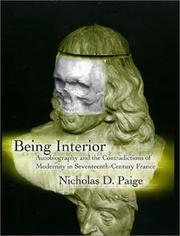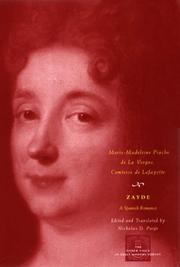| Listing 1 - 8 of 8 |
Sort by
|
Multi
ISBN: 9781108890861 9781108835503 9781108812849 1108835503 1108812848 1108880703 1108890865 1108875637 Year: 2021 Publisher: New York, N.Y. Cambridge University Press
Abstract | Keywords | Export | Availability | Bookmark
 Loading...
Loading...Choose an application
- Reference Manager
- EndNote
- RefWorks (Direct export to RefWorks)
Based on a systematic sampling of nearly 2000 French and English novels from 1601 to 1830, this book's foremost aim is to ask precisely how the novel evolved. Instead of simply 'rising', as scholars have been saying for some sixty years, the novel is in fact a system in constant flux, made up of artifacts - formally distinct novel types - that themselves rise, only to inevitably fall. Nicholas D. Paige argues that these artifacts are technologies, each with traceable origins, each needing time for adoption (at the expense of already developed technologies) and also for abandonment. Like technological waves in more physical domains, the rises and falls of novelistic technologies don't happen automatically: writers invent and adopt literary artifacts for many diverse reasons. However, looking not at individual works but at the novel as a patterned system provides a startlingly persuasive new way of understanding the history and evolution of artforms.
Fiction --- Comparative literature --- English literature --- French literature --- anno 1700-1799 --- anno 1800-1899 --- French fiction --- English fiction --- History and criticism&delete& --- Data processing --- Research&delete& --- Metafiction --- Novellas (Short novels) --- Novels --- Stories --- Literature --- Novelists --- Philosophy --- History and criticism --- Data processing. --- Research
Book
ISBN: 1283897172 0812205103 0812243552 9780812243550 Year: 2011 Publisher: Philadelphia: University of Pennsylvania press,
Abstract | Keywords | Export | Availability | Bookmark
 Loading...
Loading...Choose an application
- Reference Manager
- EndNote
- RefWorks (Direct export to RefWorks)
Fiction has become nearly synonymous with literature itself, as if Homer and Dante and Pynchon were all engaged in the same basic activity. But one difficulty with this view is simply that a literature trafficking in openly invented characters is a quite recent development. Novelists before the nineteenth century ceaselessly asserted that their novels were true stories, and before that, poets routinely took their basic plots and heroes from the past. We have grown accustomed to thinking of the history of literature and the novel as a progression from the ideal to the real. Yet paradoxically, the modern triumph of realism is also the triumph of a literature that has shed all pretense to literalness. Before Fiction: The Ancien Régime of the Novel offers a new understanding of the early history of the genre in England and France, one in which writers were not slowly discovering a type of fictionality we now take for granted but rather following a distinct set of practices and rationales. Nicholas D. Paige reinterprets Lafayette's La Princesse de Clèves, Rousseau's Julie, ou la Nouvelle Héloïse, Diderot's La Religieuse, and other French texts of the seventeenth and eighteenth centuries in light of the period's preoccupation with literal truth. Paige argues that novels like these occupied a place before fiction, a pseudofactual realm that in no way leads to modern realism. The book provides an alternate way of looking at a familiar history, and in its very idiom and methodology charts a new course for how we should study the novel and think about the evolution of cultural forms.
Fiction --- English fiction --- French fiction --- French literature --- English literature --- Fiction writing --- Metafiction --- Writing, Fiction --- Authorship --- Technique. --- Themes, motives. --- French fiction - 17th century - Themes, motives --- French fiction - 18th century - Themes, motives --- English fiction - 17th century - Themes, motives --- English fiction - 18th century - Themes, motives --- Fiction - Technique --- Cultural Studies. --- Literature. --- anno 1600-1699 --- anno 1700-1799

ISBN: 9780812235777 0812235770 Year: 2001 Publisher: Philadelphia: University of Pennsylvania press,
Abstract | Keywords | Export | Availability | Bookmark
 Loading...
Loading...Choose an application
- Reference Manager
- EndNote
- RefWorks (Direct export to RefWorks)
Sociology of literature --- Psychological study of literature --- French literature --- anno 1600-1699 --- France --- Autobiography --- Authors, French - Biography - History and criticism --- Authors, French
Book
Year: 1998 Publisher: Berkeley: University of California,
Abstract | Keywords | Export | Availability | Bookmark
 Loading...
Loading...Choose an application
- Reference Manager
- EndNote
- RefWorks (Direct export to RefWorks)
Religious biography --- Mysticism --- Sex role
Book
ISBN: 9780812205107 Year: 2011 Publisher: Philadelphia
Abstract | Keywords | Export | Availability | Bookmark
 Loading...
Loading...Choose an application
- Reference Manager
- EndNote
- RefWorks (Direct export to RefWorks)
Multi
ISBN: 9780812205107 9780812243550 Year: 2011 Publisher: Philadelphia, Pa University of Pennsylvania Press
Abstract | Keywords | Export | Availability | Bookmark
 Loading...
Loading...Choose an application
- Reference Manager
- EndNote
- RefWorks (Direct export to RefWorks)

ISBN: 1281125830 9786611125837 0226468445 9780226468440 9780226468518 0226468518 9780226468525 0226468526 0226468518 0226468526 Year: 2006 Publisher: Chicago ; London University of Chicago Press
Abstract | Keywords | Export | Availability | Bookmark
 Loading...
Loading...Choose an application
- Reference Manager
- EndNote
- RefWorks (Direct export to RefWorks)
Standing at the critical juncture between traditional romance and early novelistic realism, Zayde is both the swan song of a literary tradition nearly two thousand years old and a harbinger of the modern psychological novel. Zayde unfolds during the long medieval struggle between Christians and Muslims for control of the Iberian Peninsula; Madame de Lafayette (1634-93) takes the reader on a Mediterranean tour typical of classical and seventeenth-century romances-from Catalonia to Cyprus and back again-with battles, prophecies, and shipwrecks dotting the crisscrossed paths of the book's noble lovers. But where romance was long and episodic, Zayde possesses a magisterial architecture of suspense. Chaste and faithful heroines and heroes are replaced here by characters who are consumed by jealousy and unable to love happily. And, unlike in traditional romance, the reader is no longer simply expected to admire deeds of bravery and virtue, but instead is caught up in intense first-person testimony on the psychology of desire. Unavailable in English for more than two centuries, Zayde reemerges here in Nicholas Paige's accessible and vibrant translation as a worthy representative of a once popular genre and will be welcomed by readers of French literature and students of the European novelistic tradition.
Love. --- French literature --- Affection --- Emotions --- First loves --- Friendship --- Intimacy (Psychology) --- La Fayette, --- iberian peninsula, medieval, christianity, islam, religion, spirituality, empire, borders, madame de lafayette, romance, novel, literature, suspense, sensation, lovers, nobility, aristocracy, shipwrecks, class, adventure, prophecy, fate, destiny, battles, war, military, cyprus, catalonia, jealousy, love, lust, desire, passion, sexuality, translation, french.
Digital

ISBN: 9783110486278 9783110484991 9783110482805 Year: 2019 Publisher: Berlin ;; Boston De Gruyter
Abstract | Keywords | Export | Availability | Bookmark
 Loading...
Loading...Choose an application
- Reference Manager
- EndNote
- RefWorks (Direct export to RefWorks)
| Listing 1 - 8 of 8 |
Sort by
|

 Search
Search Feedback
Feedback About UniCat
About UniCat  Help
Help News
News